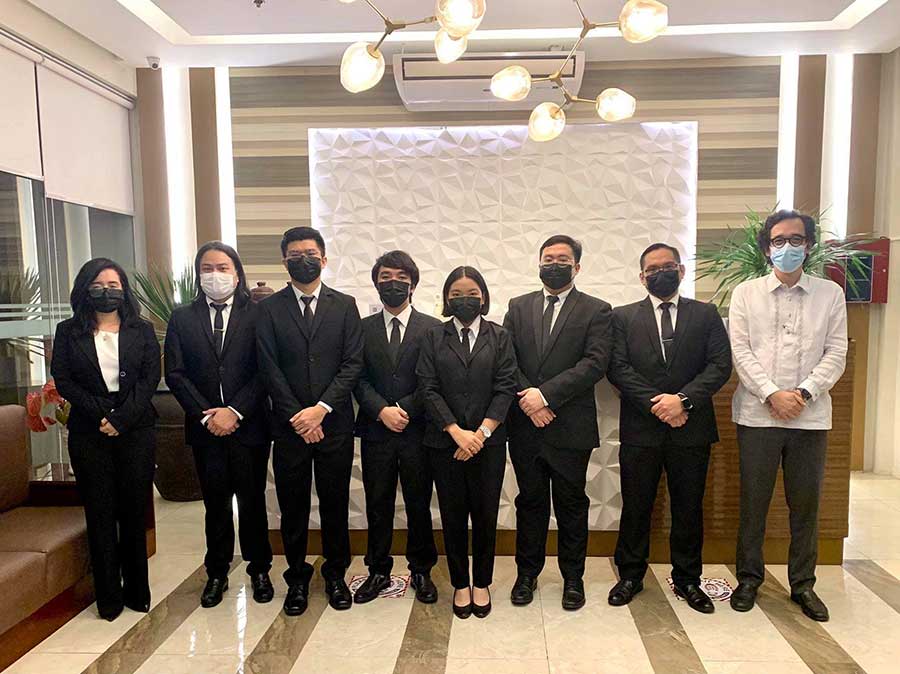
By Joseph B.A. Marzan
The University of San Agustin-College of Law (USA-COL) will represent the Philippines in the international moot court stage after winning the National Moot Court Competition on International Humanitarian Law (NMCC on IHL) held virtually on Oct. 18 to 22, 2021.
The NMCC on International Humanitarian Law is organized yearly by the International Committee of the Red Cross and the Philippine Red Cross.
The USA-COL team defeated defending champion University of the Philippines-Diliman in the final round after besting 13 teams from other schools.
The team was composed of freshmen, sophomore, and junior law students from USA-COL, with Jeff Earl Nuñez, Blessie Marie Cawaling, and Mark David Dacula as speakers. Their coach is Daily Guardian columnist, Atty. Anfred Panes.
Megan Cortez, Danny Dy Quioyo, and Bjorn Denfield Hudierrez also joined the team as support staff.
USA-COL Dean Jose Mari Benjamin Francisco Tirol and Judge Elijo Herrera-Bellones also provided assistance to the team.
Nuñez and Cawaling were named Overall Best Mooter and 2nd Best Mooter, respectively. Their Memorials, which refer to their written submissions before the judges acting as a mock International Criminal Court, also won overall for both prosecution and defense sides.
In an interview with Super Radyo Iloilo on Sunday, Panes expressed happiness over their victory, saying that it was a fruit of their hardships.
Panes said Nuñez prepared for around a year, with Cawaling joining him after, before heading off to the virtual competition.
Their preparations included research in preparation for the memorials and their oral competition, with help from USA-COL faculty and alumni who mounted simulated moot court competitions with them.
“The [USA-COL] is happy over the feat. It wasn’t easy before we were declared as the champion. We went through a lot before getting to this point,” Panes said.
He also explained the process of moot court competitions, where law students appear in a mock international court panel, which simulated the real International Court of Justice (ICJ) or International Criminal Court (ICC).
“In a mock court, law students are handling imaginary problems. Usually, this is on an international level, so they will be appearing before the [ICJ or the ICC], depending where they are competing. They are trained to speak respectfully and with substance and form before a judge or a justice,” he said.
Nuñez said they never expected to win, but kept their eye on the top prize nonetheless, citing Cortez’s finals finish in the 2020 edition of the NMCC on IHL.
“I’m very happy and very proud that all of our hard work has resulted to us winning and recognized as a team. We worked really hard to get where we are. We always respected each team, we told them that they were good, and we never let our guard down,” Nuñez said.
Cortez said that they were amazed with Nuñez and Cawaling’s performances, especially with the latter since this was her first time competing.
“[Nuñez] focused on the [NMCC on IHL], reading on IHL and cases decided by the ICC. [Cawaling] is a very fresh mooter. We were amazed by the pace of their adopting, learning, and cramming all the information in their brains. We’re very very happy that they took it upon themselves to do everything to bring the championship home to San Agustin,” Cortez said.
She also discussed the benefit of moot court competitions to law students, saying that whatever they learn in practicing as well as the main competition, they are able to carry over when they eventually become lawyers.
She cited IHL, which is also discussed in human rights and public international laws classes at the USA-COL.
“We’re not forced to join moot court competitions. Dean [Tirol], Atty. Panes, and Judge [Herrera-Bellones] just encourage us to join. We also see the benefit in joining moot court competitions, because we don’t only practice speaking, but also writing, rehearsing, knowing about the law. What’s good is that whatever we learn in our competitions, we bring it over to our classes,” she said.
The team will be going to Hong Kong in 2022 for the 20th Red Cross International Humanitarian Law Moot Court Competition.




















